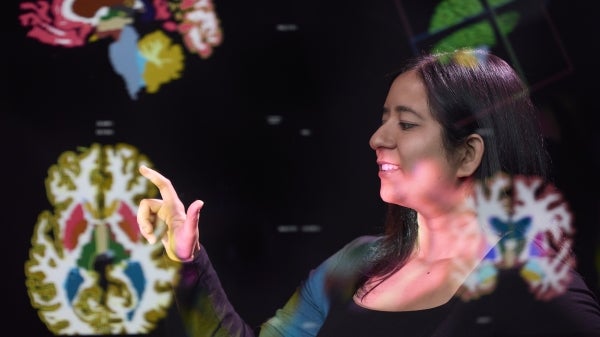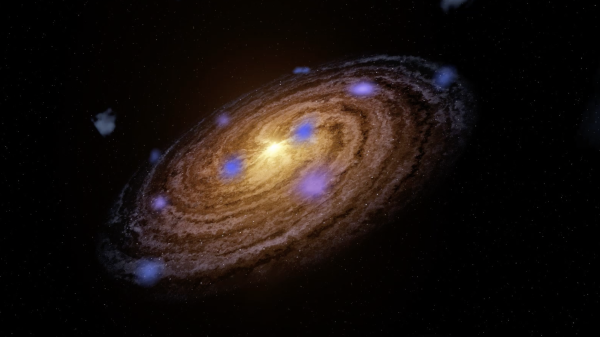Editor’s note: This is part of a series of profiles for fall 2018 commencement. Read about more graduates.
International student Jin Wook Chung first studied in his home country of South Korea at Kangwon National University before making the decision to come to the United States to pursue his educational goals.
After studying for two years at East Tennessee State, Chung decided he wanted to attend a larger school and transferred to ASU’s School of Molecular Sciences to major in chemistry.
Chung's interest in science has a personal motivation: his mother and grandmother. When he was a young child, Chung’s mother was diagnosed with breast cancer and his grandmother developed Alzheimer’s, two major influences in his desire to become a physician someday.
Bruce Marsh, professor of practice in the School of Sustainable Engineering and the Built Environment taught Chung in his Earth Systems and Sustainable Engineering class in the spring of 2017. The class is primarily for seniors, and yet as a junior Chung was in the top 2 percent of the class. Marsh describes Chung as a very special student at ASU and said he was very fortunate to have had him in his class.
“Jin Wook is a very bright scholar with a delightful personality. He works very hard and put himself all out to be successful in my class," said Marsh. "I came to know him as he was always asking insightful questions and coming back to me with progress at every turn on the good work that he was doing. I believe he is the kind of person who would excel at whatever he decides to work on. He is the kind of person who will help to look at the challenges we face from different perspectives and would be driven to help you and your team find alternatives and solutions that could benefit many other people.”
Question: What was your “aha” moment, when you realized you wanted to study the field you majored in?
Answer: When I decided to transfer to ASU for more opportunities to gain experience in the medical field. The Phoenix area has so many large hospitals and I was able to get a job in the pathology lab at Banner Health in Mesa. Over last summer I began to do an internship at Seoul National University Cancer Research Institute, utilizing the basic lab skills such as cell culture, immunohistochemistry and fluorescent microscopy that I learned studying in the Keck Bioimaging lab here at ASU.
Q: What’s something you learned while at ASU — in the classroom or otherwise — that surprised you or changed your perspective?
A: I took a civil engineering class to broaden my perspective with Professor Bruce Marsh. Part of the class held debates in class and helped me gain more insight to become a better problem solver and look at issues from a multidimensional aspect.
Q: Why did you choose ASU?
A: ASU is a large university with many opportunities for students.
Q: Which professor taught you the most important lesson while at ASU?
A: Professor Marsh in many ways was a mentor to me, very supportive in a way that is different from my professors in South Korea. In Korea, the professors keep everything about academics and here at ASU, Professor Marsh really helped me as a friend, father-figure and as a professor.
Q: What’s the best piece of advice you’d give to those still in school?
A: For international students — don’t be shy! Ask a question from your advisors and instructors. Make American friends because they can help you with advice and information. My friends helped me in finding jobs and helped with my schoolwork.
Q: What was your favorite spot on campus, whether for studying, meeting friends or just thinking about life?
A: Danforth Chapel to pray and the Noble Science Library to meet friends.
Q: What are your plans after graduation?
A: I am applying to medical school in South Korea and have an interest in studying neuroscience or gastric science.
Q: If someone gave you $40 million to solve one problem on our planet, what would you tackle?
A: Diabetes and obesity. I would build and fund free fitness centers to promote healthy living, exercise and being active. The fitness centers would also have trainers and staff available to help people with diet and exercise.
More Science and technology

New NIH-funded program will train ASU students for the future of AI-powered medicine
The medical sector is increasingly exploring the use of artificial intelligence, or AI, to make health care more affordable and…

Cosmic clues: Metal-poor regions unveil potential method for galaxy growth
For decades, astronomers have analyzed data from space and ground telescopes to learn more about galaxies in the universe.…

Indigenous geneticists build unprecedented research community at ASU
When Krystal Tsosie (Diné) was an undergraduate at Arizona State University, there were no Indigenous faculty she could look to…
